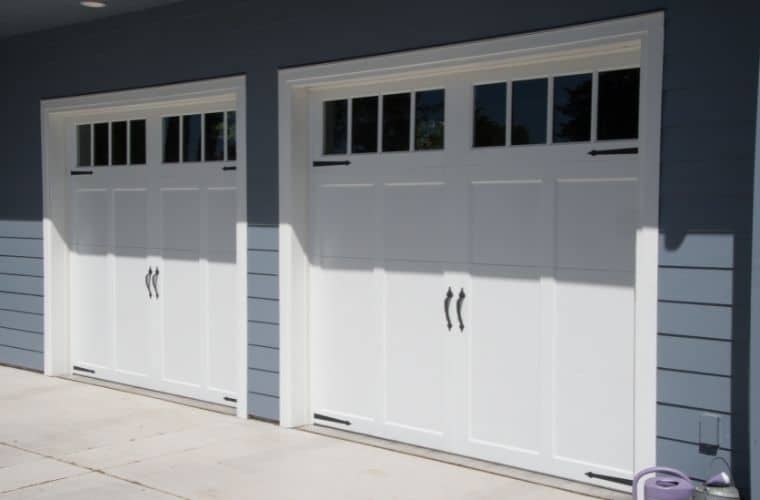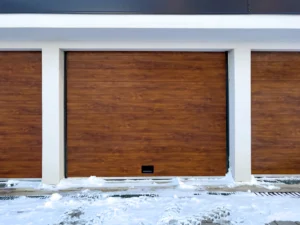Benefits Of Having Insulated Garage Door
Insulated garage doors are typically made of aluminum, a lightweight material that can be easily installed. However, some insulated garage doors are steel and have an insulated core. Both materials have pros and cons: steel insulated garage doors are more durable but heavier. In contrast, aluminum-insulated garage doors tend to be lighter but less durable.
When choosing between the two, it is essential to consider the climate in which you live and how often you use your garage. Steel will be a better choice if you live in an area with extreme temperatures. If you do not use your garage often or have a smaller budget, aluminum would be more economical. Now let’s see the main benefits of insulated garage doors:
Energy-Efficient Garage Tip
Add insulation to your garage door if it's not already insulated. This will help keep the temperature in your garage stable year-round. You can find garage door insulation kits in hardwood stores
Quiet Garage
Many homeowners are looking for insulated garage doors to keep the noise from their garage to a minimum. Insulated garage doors are often made from a thicker material, which can help reduce the noise coming into and out of your garage. However, noise is not just a problem in and out of your garage. It is also an issue when you’re trying to work on projects in your garage or just relax and watch TV inside your home.
An insulated garage door will make a significant difference in reducing the noise. If you live in an urban area, this can be a lifesaver!
Reduce energy costs
Another fantastic benefit of insulated garage doors is that they help to reduce your energy costs. By keeping the heat in during winter and the cool air in during summer, you will not have to run your heating and cooling system as often. This can lead to considerable savings on your utility bills.
Well-insulated garage doors can be expensive, but they are worth it if you want to reduce your energy bills and enjoy a quieter space. The insulation provides a barrier between the inside and the outside of the garage temperature, which will help keep the cold air out and the warm air in. This is especially important for garages that have an attached living space.
Protect your belongings
If you have a lot of valuable belongings in your garage, an insulated garage door helps to protect them. Keeping the garage temperatures and humidity levels stable can prevent damage to your belongings caused by extreme temperatures and fluctuations.
Increased resale value
If you’re thinking about selling your home in the future, an insulated garage door can add to the resale value. Because they offer so many benefits, buyers are willing to pay more for a home with an insulated garage door.

Insulated door vs non-insulated ones
There are a few key differences between insulated and non-insulated doors. Here’s what you need to know:
- Insulated doors are more energy-efficient. They will keep your garage warmer in the winter and cooler in the summer.
- Non-insulated garage doors are less expensive.
- Insulated garage doors are more durable. They will not warp or dent as easily as non-insulated doors.
- Non-insulated garage doors are easier to install.
If you’re looking for an energy-efficient garage door, go with an insulated door. If you’re looking for a cheaper option, go with a non-insulated door. Either way, you can’t go wrong with a new garage door!
How Garage Door Insulated?
Garage doors are insulated to keep the heat and cold out. And it also helps to prevent the garage from getting too hot or cold. Two main types of insulation can be used for garage doors – Polystyrene foam and polyurethane insulation.
Garage doors are typically made of steel, a good conductor of heat and cold. Insulating them with foam, fiberglass, or a combination of both materials is essential.
A better look of the types:
Fiberglass
Fiberglass has a low R-value, but it’s affordable and easy to install.
Cellulose
Cellulose is made from recycled paper and is environmentally friendly.
Mineral Wools
Mineral wools are made from natural minerals, so it doesn’t contain any harmful substances.
Polyurethane Insulation:
Polyurethane doors are made with two layers of steel filled with insulation, usually polyurethane foam. The steel layers are then bonded together with an adhesive. These doors provide good energy efficiency and are very strong and durable.
Polystyrene Foam:
Polystyrene garage doors have a layer of steel, followed by a layer of polystyrene insulation and another layer of steel on the outside. These garage doors are not as strong as polyurethane doors, but they provide good energy efficiency and can be a good choice if you’re looking for an inexpensive insulated door.
Energy-Efficient Garage Tip
Replace your old garage door opener with a new, energy-efficient model
Things to consider when you buy insulated door
Choosing the right insulated garage door for your home is a decision that will have a significant impact on the energy efficiency of your home. There are many factors to consider when choosing an insulated garage door, and the type of insulation is just one of them. Here are some things to keep in mind when choosing an insulated garage door for your home:
- R-value: The higher the R-value, the better the door will be at keeping your garage warm in the winter and cool in the summer. When choosing an insulated garage door, look for one with a high R-value.
- U-factor: The U-factor measures how much heat is lost through the door. The lower the U-factor, the better the door will be at keeping your garage warm in the winter and cool in the summer. When choosing an insulated garage door, look for one with a low U-factor.
- Solar reflectance: Solar reflectance measures how well the door reflects sunlight. The higher the solar reflectance, the better the door will keep your garage cool in the summer. When choosing an insulated garage door, look for one with high solar reflectance.
- Air leakage: Air leakage is the amount of air that leaks through the door. The fewer air leaks through the door, the better the door will be at keeping your home energy efficient. When choosing an insulated garage door, look for one with a low air leakage rating.
- Cost: The cost of an insulated garage door will vary depending on the materials used, and the size of the door. When choosing an insulated garage door, compare prices to get the best deal.
- Warranty: Make sure to choose an insulated garage door with a warranty. This will protect you in case something goes wrong with the door.
- Installation: Installing an insulated garage door can be tricky. If you are not experienced in this area, hiring a professional to install the door is best.
- Maintenance: Insulated garage doors require little maintenance other than occasional cleaning. However, it is crucial to ensure that the door is working correctly and that there are no gaps or cracks.
- Location: The location of your insulated garage door is essential when choosing an insulated garage door. If you live in an area with extreme temperatures, it is best to choose a door for that climate. If you live in milder weather, you can select a door that is not as insulated.
- Style: There are many different styles of insulated garage doors to choose from. You can choose a traditional style door, a contemporary style door, or even a custom-made door. When choosing an insulated garage door, be sure to pick one that will complement the style of your home.
Energy-Efficient Garage Tip
Install weatherstripping around the door to seal gaps and prevent drafts.
Understanding R-value
R-value is a measure of thermal resistance. It is the measure of insulation’s ability to resist heat flow. The higher the R-value, the better it will insulate a structure from heat flow. The R-value is calculated by multiplying the thickness of insulation by its U-factor.
The R-value indicates how well insulated a product is. It’s a measure of thermal resistance. When choosing an insulated garage door, you will want to know how much insulation it has and what type of insulation it is made with.
Understanding U-value
The new standard of rating garage doors is U-factors or U values. This considers the entire assembly: frame panels and hardware to determine how effective they will be at blocking heat transfer from entering your home in the summer or escaping it in the winter. U-factor is expressed as a number between 0 and 1, with lower numbers being more energy efficient. The older standard of R-value is less common to rate garage doors.
What is an ideal U-factor for a garage door?
You want a low U-factor for a garage door, indicating good insulation. The U.S. Department of Energy recommends a U-factor of 0.30 or less for garage doors in moderate climates and 0.15 or less for those in very cold climates.
Are you looking for an insulated Garage Door?
What is it STC RATINGS?
STC Ratings are a measure of thermal insulation and airtightness. The higher the STC Rating, the better the insulation and airtightness of the product. For example, a garage door with an STC Rating of 50 will have better insulation and airtightness than one with an STC Rating of 30. The STC Ratings are measured in units called “hours.”
STC Ratings is a rating system that measures a building envelope’s insulation and air sealing performance. The higher the STC rating, the better insulated and air-sealed the building is. STC ratings are a measure of the insulation properties of a material. The higher the STC rating, the more airtight and insulating material is.
The STC rating is calculated by measuring the amount of sound that passes through an object such as an insulated door or window. The higher the STC rating, the better insulation properties it has.
What is a good STC rating for a garage door?
STC is a measure of insulation effectiveness. It stands for “Sound Transmission Class.” The higher the STC rating, the more soundproof the door. The STC rating for insulated garage doors varies from 35 to 50. A higher STC rating means that the door is more soundproof and will help reduce noise from outside coming into your garage, which can be helpful in certain situations. A good STC rating for insulated garage doors is above 50dB.
How to improve the STC rating for the garage door?
The STC rating of a door is calculated by the amount of sound that can pass through it. This is measured in decibels, with higher values indicating more noise. For example, a door rated at 50dB would allow twice as much sound to pass through it as one rated at 25dB. The STC rating for insulated garage doors ranges from 39 to 53 dB.
This means that the insulation does not impact the STC rating much – which is why we recommend insulating your garage door if you want to lower its noise levels. The STC rating measures the insulation performance of a building envelope. It is measured in units of R-value, with higher numbers being better.
The best way to improve the STC rating for the insulated garage doors would be to seal the doors’ joints and cracks. This will help keep heat out and reduce air infiltration.
Is it worth it to have an insulated garage door?
Generally, insulated garage doors are worth the investment. They can save you money on energy bills and make your garage more comfortable in extreme weather conditions. Insulated doors reduce heat loss by up to 50%. They can reduce your energy bill by up to 20%. They provide better sound insulation. And can be a good investment as they last longer and maintain their value better.
An insulated garage door is more durable than a non-insulated one. They will last longer and require less maintenance. If you are looking for a durable garage door, an insulated one is the right garage door for you.
However, Insulating a garage door is expensive, costing between $900-$1,200, depending on the door size and how much insulation is needed. Your home insurance policy may not cover this cost. To install an insulated door, you need to remove your current garage door opener and replace it with one that has an automatic reversing feature.
Energy-Efficient Garage Tip
Install a door sweep on the bottom of the door to seal gaps and prevent drafts
Modern insulated garage doors materials
In the modern era, there are many options for insulation. Regardless of material or style – all doors can be insulated and still maintain their beauty with a new garage door. The most common is the aluminum or steel frame, and they filled with solid core insulation
The most common modern garage doors:
Steel Garage Door
The most common insulated garage doors are made of steel. Steel doors are very durable and require little maintenance. They are also one of the most affordable options. A steel door is the best choice if you are looking for an insulated garage door on a budget.
Aluminum Garage Doors:
Aluminum garage doors are a step up from steel doors in terms of price and durability. Aluminum doors will not rust or corrode as steel doors can. They are also low-maintenance and lightweight, making them easy to install. An aluminum door is the best choice if you want a durable, low-maintenance option.
Wooden Garage Doors:
Wooden garage doors are the most expensive option but offer the most curb appeal. Wooden doors can be stained or painted to match the exterior of your home. They are also very durable and require little maintenance. A wooden door is the best choice if you are looking for an insulated garage door that will make a statement.
Composite Garage Doors:
Composite garage doors are made of wood fibers and resin. They are designed to look like wood but are more durable and require less maintenance. Composite doors are a good choice if you want the look of wood without the high price tag.

Energy-Efficient garage doors
Double-layer and triple-layer doors are designed for energy efficiency. These doors have two or three layers of insulation that trap heat in the garage.
Double-Layer Garage Doors:
Double-layer garage doors have two layers of insulation. The first layer is usually made of polystyrene foam, and the second layer is made of fiberglass. This combination makes for an energy-efficient door that will keep your garage warm in the winter and cool in the summer.
Triple-Layer Door:
Triple-layer garage doors have three layers of insulation. The first layer is usually made of polystyrene foam, the second layer is made of fiberglass, and the third layer is made of polyurethane foam. This combination makes for an even more, energy-efficient door to keep your garage comfortable year-round.
Insulated garage door FAQ
what is the cost of new Insulated garage door?
The cost of a new insulated garage door will depend on the size, style, and material of the door. Steel doors are the most affordable option, while wooden doors are the most expensive. The cost of installation will also play a role in the final price. Expect to pay between $700 and $2000 for an insulated garage door.
What is the best material for an insulated garage door?
The best material for an insulated garage door will depend on your needs and budget. Steel doors are the most affordable option, while wooden doors are the most expensive. Aluminum and composite doors are good choices for those looking for a durable and low-maintenance option.
Does a single layer door can be insulated?
Single layer doors cannot be insulated. Double-layer and triple-layer doors are designed for energy efficiency and will trap heat in the garage.





